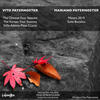In 2005, the great Italian composer Francesco D'Avalos, in his book "La Crisi
dell'Occidente e la presenza della Storia" (The meaning of the Twentieth century
through the evolution of music - edited by the Bietti publishing house)
remembers his favorite pupil: "Vito Paternoster wrote beautiful music of a rare
originality. I remember Inzaffirìo and The Bread.... he had such a deep
knowledge of traditional harmony that he could use it in all its expressive
potentialities whilst still respecting its strictest rules."
The language that he possessed in all its potential becomes a game of
manipulation, overlapping and connecting distant references, alluding to ancient
times, distant places and leading to a joyful nostalgia.
It is not a rejection of the present, but an attempt to overcome it.
His musical language draws equally from elements of Vivaldi to Jazz styles, from
Bach to Pop music, from Strauss to Folk music.
The strong coupling of national popular melodies however is very far from its
nineteenth-century practice aimed to create and improve national identities for
the early Nation States. On the contrary: the idea of national culture, and
everything that is related with localisms, is removed from its original function
becoming, with a slight irony, a pretext to create some elegant music language
games. The popular themes are adapted to trans-national and universal contexts,
and the local musical colors are confined to the realm of memory, of a glorious
but mythical past, distant in time and space. It is a way to enrich the present
with some hope.
Full liner notes are available for download to members.



